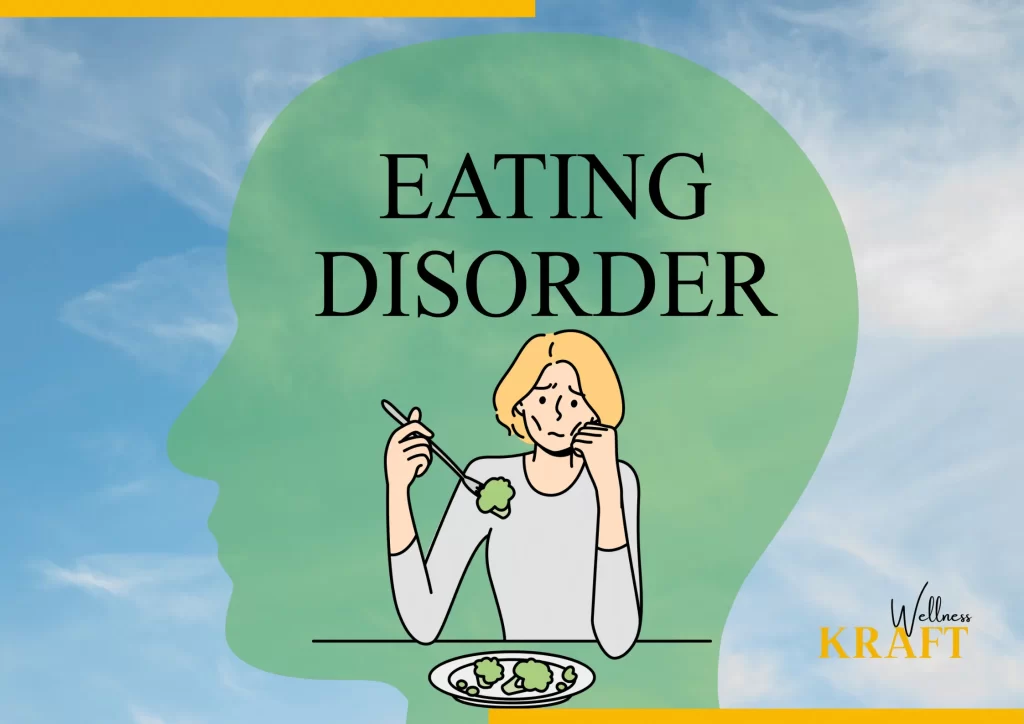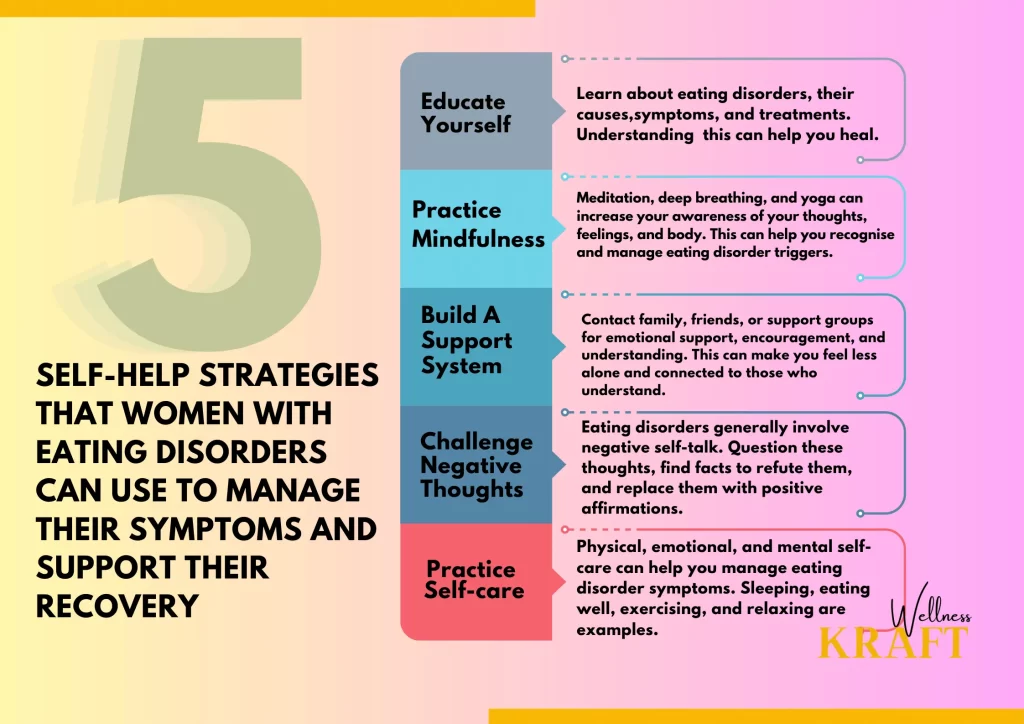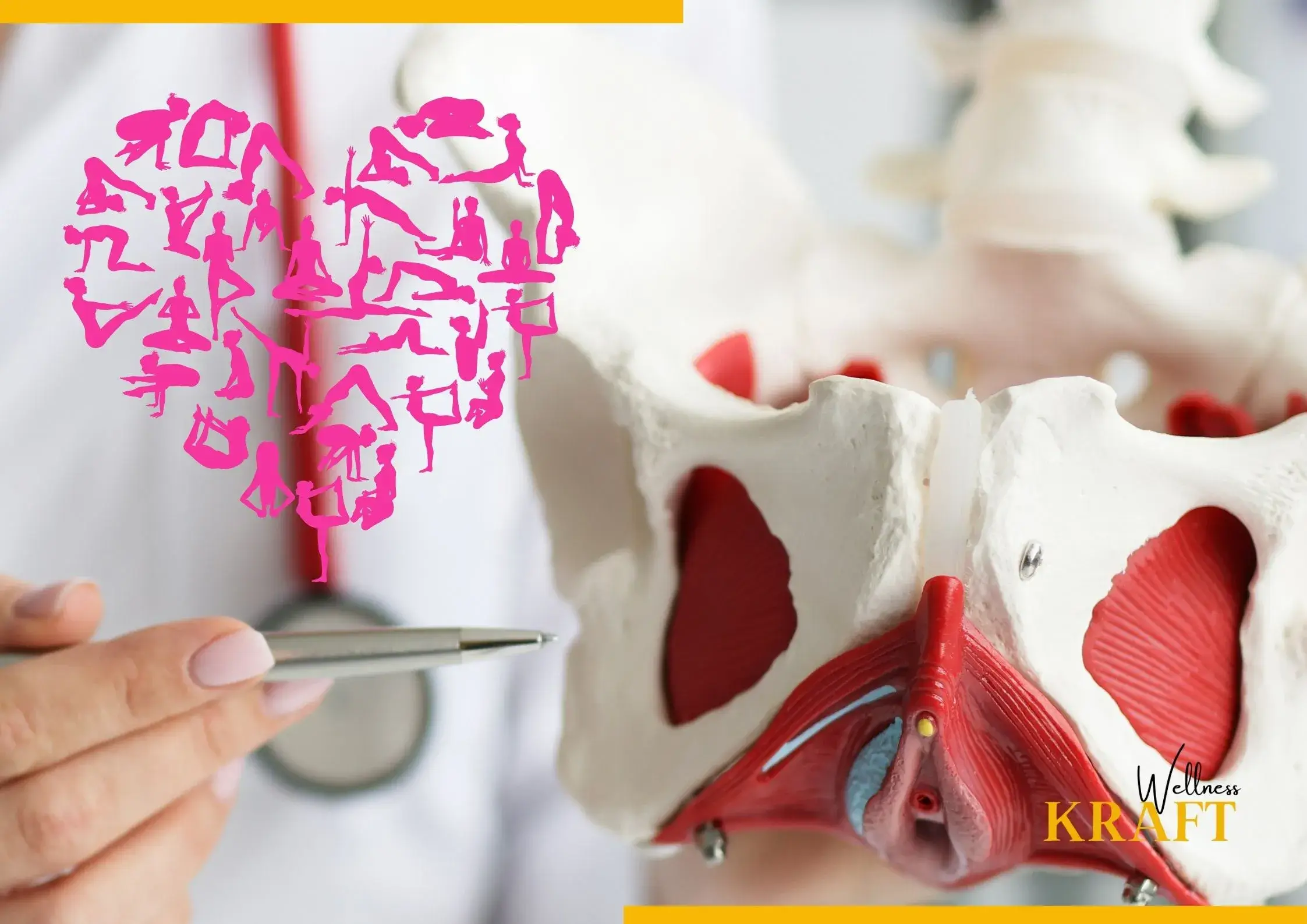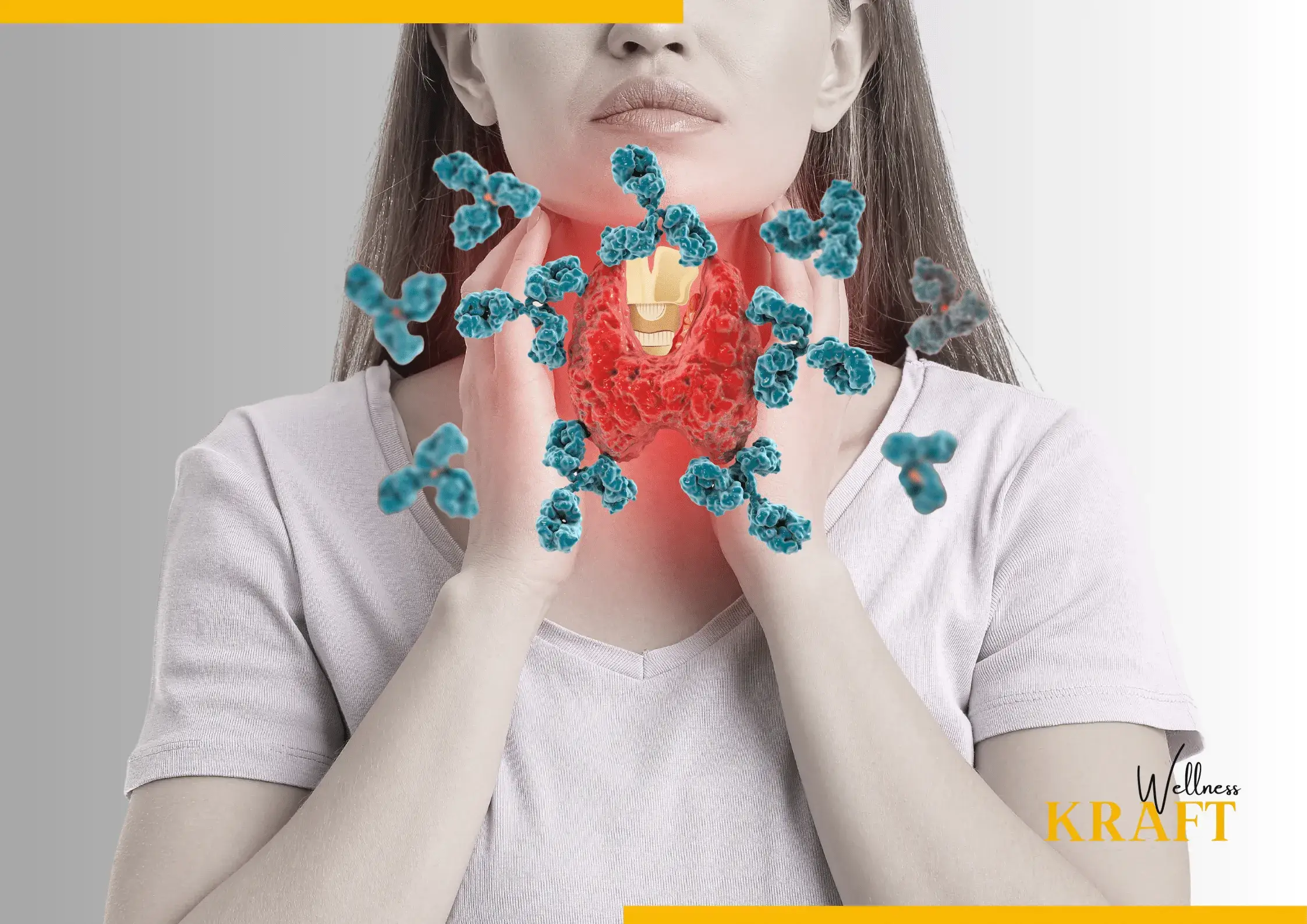“A fatal mental condition that can ruin your health, happiness, and relationships, eating disorders are not a choice of lifestyle.” – Wellness Kraft
Table of Contents
Introduction
Eating disorder is a serious mental health condition that can affect anyone, regardless of age, gender, race, or ethnicity. However, women are more likely to develop eating disorders than men, with estimates suggesting that up to 90% of people with an such disorder are female. In this article, we will discuss what eating disorder is ? Why they affect women more than men, and how to manage and treat them.
What are Eating Disorders?

Eating disorders are a group of mental health illnesses characterised by unfavourable connections with food, weight, and physical appearance. The most common types of eating disorders are anorexia nervosa, bulimia nervosa, and binge eating disorder.
1.Anorexia nervosa is characterized by an extreme fear of gaining weight and a distorted body image. People with anorexia often restrict their food intake to a dangerous level, leading to severe malnutrition and other health complications.
2.Bulimia nervosa involves binge eating followed by purging, such as vomiting or using laxatives.
3.Binge eating disorder is characterized by recurrent episodes of eating large amounts of food in a short period, often feeling out of control and ashamed afterward.
Why Do Women Suffer from Eating Disorders More Than Men?
The exact reasons why women are more likely to develop this disorder than men are not fully understood. However, research suggests that a combination of biological, psychological, and cultural factors may contribute to this gender disparity. Biological factors such as genetics, hormonal changes, and brain chemistry may make some women more susceptible to developing eating disorders. Psychological factors such as low self-esteem, perfectionism, and anxiety may also play a role. Finally, cultural factors such as media pressure to conform to thin beauty standards, societal emphasis on dieting, and weight stigma may contribute to the development of eating disorders in women.
Managing and Overcoming Eating Disorders in Women

If you suspect that you or someone you know may have an eating disorder, it’s essential to seek professional help. It is a serious mental health conditions that can have severe health consequences if left untreated. The earlier the treatment starts, the better the chances of a full recovery.
The first step in managing and treating is usually to consult with a healthcare professional, such as a doctor, a registered dietitian, or a mental health counselor. Treatment may involve a combination of therapies, such as cognitive-behavioral therapy (CBT), family-based therapy, and medication. CBT aims to help individuals identify and change negative thoughts and behaviors related to food, body image, and weight.
Family-based therapy involves working with the family to support the person’s recovery from such disorder. Medication may be prescribed to manage co-occurring mental health conditions, such as depression or anxiety.
In addition to professional treatment, there are several self-help strategies that women with eating disorders can try to manage their symptoms. These include:
However, there are also some self-help strategies that women with eating disorder can use to manage their symptoms and support their recovery. Here are five strategies:
5 Strategies to Manage Eating Disorder in Women

1.Educate yourself: Learn as much as you can about this symptom, their causes, symptoms, and treatment options. This knowledge can help you understand your own experience and provide a foundation for your recovery.
2.Practice mindfulness: Mindfulness techniques such as meditation, deep breathing, and yoga can help you become more aware of your thoughts, feelings, and bodily sensations. This can help you identify triggers for your eating disorder and develop strategies to manage them.
3.Build a support system: Reach out to family members, friends, or support groups who can offer emotional support, encouragement, and understanding. This can help you feel less isolated and more connected to others who understand what you’re going through.
4.Challenge negative thoughts: Eating disorders are often accompanied by negative thoughts and self-talk. Challenge these thoughts by questioning their accuracy, looking for evidence that contradicts them, and replacing them with positive affirmations.
5.Practice self-care: Taking care of yourself physically, emotionally, and mentally can help you manage your eating disorder symptoms. This can include getting enough sleep, eating nutritious foods, engaging in regular exercise, and practicing relaxation techniques.
Remember that recovery from an eating disorder is a process, and it can take time and effort. Seeking professional treatment is crucial, but these self-help strategies can complement your treatment and help you manage your symptoms on a day-to-day basis.
1.Keep a food diary to track food intake and identify patterns of disordered eating.
2.Develop a regular eating routine and try to eat meals and snacks at the same time each day.
3.Avoid dieting and restrictive eating behaviors.
4.Practice self-care activities such as yoga, meditation, or relaxation exercises to manage stress and anxiety.
5.Surround yourself with supportive friends and family members who can offer encouragement and help with recovery.
Analysis on Eating Disorder
Research on eating disorders in women has shown that they are a global health concern. However, there are variations in the prevalence and incidence rates of these conditions among different countries.
Studies have suggested that Western countries, such as the United States, Canada, and European nations, have higher rates of eating disorders in women compared to non-Western countries. This may be attributed to societal pressure to conform to a certain body type and the influence of Western media promoting thinness as an ideal beauty standard.
A comparative analysis of prevalence rates in different countries found that Japan and other Asian countries have lower rates of disorders in women compared to Western countries. However, this trend may be changing as globalization and Westernization are increasingly affecting beauty ideals and cultural norms around body image in these countries.
Research has also shown that such disorders in women are more common in high-income countries compared to low- and middle-income countries. This may be due to differences in access to healthcare, education, and economic resources, which can impact the prevalence and treatment of such disorders.
Research suggests disorders in women has shown that they are more likely to be affected by these conditions than men. This is evident in the high prevalence rates of eating disorders, such as anorexia nervosa, bulimia nervosa, and binge eating disorder, among women. According to the National Eating Disorders Association, up to 20 million women in the United States alone will experience an such disorder at some point in their lives.
Research has identified several risk factors for the development of such disorders in women. These include genetic predisposition, societal pressure to conform to a certain body type, dieting, and low self-esteem. Additionally, hormonal changes during puberty, pregnancy, and menopause can also increase a woman’s susceptibility to developing an eating disorder.
Studies have also shown that women are more likely to experience comorbid mental health conditions, such as depression, anxiety, and substance abuse. These conditions can further exacerbate the symptoms and make recovery more challenging.
Effective treatment for such disorders in women typically involves a multidisciplinary approach, including psychotherapy, medication, and nutritional counseling. It’s important for women to seek professional help early on in the development of an eating disorder, as early intervention can lead to better outcomes.
Overall, research highlights the need for increased awareness, prevention efforts, and access to effective treatment options. By addressing the underlying risk factors and providing comprehensive care, we can help women recover from these complex and potentially life-threatening conditions.
Additionally, cultural factors, such as the role of food and eating practices, can also influence the development of such disorders in women. For example, in some cultures, overeating and being overweight may be considered a sign of wealth and prosperity, while in other cultures, thinness is highly valued.
In conclusion, research has highlighted the need for a nuanced understanding of the complex interplay of cultural, societal, and economic factors that contribute to the development of these conditions. By addressing these underlying factors, we can develop effective prevention and treatment strategies to support women’s health and well-being across the globe.
Concluding Thoughts
In conclusion, such disorders can be a challenging and complex mental health condition, especially for women. At Wellness Kraft, we recognize the importance of raising awareness and providing support for those struggling with these types of disorders. By understanding the unique challenges women face with it, we can better tailor our resources and support to meet their needs.
In addition to seeking professional help, there are self-help strategies that women with such disorders can use to manage their symptoms. These strategies include building a support network, challenging negative thoughts, practicing self-compassion, developing healthy coping mechanisms, and setting realistic goals.
We encourage women with such disorders to reach out to Wellness Kraft for support and access to resources that can help them on their journey towards recovery. With the right tools and support, women with such disorders can learn to manage their symptoms and improve their overall well-being.
Key Takeaways
1. Pay attention to creating a positive self-image by listing your accomplishments and positive traits and changing your negative self-talk into positive ones.
2.Eat in a calm, comfortable environment and pay attention to your body’s hunger cues to practice mindful eating.
3.Identify appropriate coping mechanisms for stress and emotions, such as physical activity, writing, or talking to a dependable friend or therapist.
4.Ask for professional assistance if necessary, such as visiting a licensed therapist or registered dietitian who specializes in treating eating problems.
5.Keep in mind that although healing requires time and effort, it is worthwhile for your mental and physical health.
FAQs
1. What is an eating disorder and how does it affect women?
It is a serious mental health conditions that can affect women of all ages. They are characterized by abnormal eating habits, such as restrictive dieting, binge eating, and purging, and can have severe physical and psychological consequences.
2. What are the different types of eating disorder that affect women?
The most common types that affect women are anorexia nervosa, bulimia nervosa, and binge eating disorder. Each of these disorders has its own set of symptoms and requires specific treatment approaches.
3. What are the signs and symptoms of an eating disorder?
Signs and symptoms can include weight loss, irregular menstrual cycles, obsession with food and weight, low self-esteem, and social withdrawal. If you are concerned that you or someone you know may have an eating disorder, seek professional help.
4. Can self-help strategies be effective in managing such disorder?
Yes, self-help strategies can be effective in managing such disorder, especially when combined with professional treatment. Some self-help strategies include building a support network, challenging negative thoughts, practicing self-compassion, developing healthy coping mechanisms, and setting realistic goals.
5. What are some healthy coping mechanisms that can help women manage their eating disorder?
Healthy coping mechanisms can include exercise, meditation, journaling, art therapy, and spending time in nature. These activities can help reduce stress and improve overall well-being.
6. How can women build a support network to manage their eating disorder?
Building a support network can involve reaching out to family and friends, joining a support group, or connecting with a therapist or other mental health professional. It’s important to have a network of people who can provide emotional support and encouragement.
7. What role does nutrition play in managing it?
Nutrition is a critical component of managing eating disorder. It’s important to work with a qualified nutritionist or dietician to develop a healthy eating plan that meets your nutritional needs and supports recovery.
8.What are some common misconceptions about it?
Common misconceptions about it include that they only affect young women, that they are caused by vanity or a lack of willpower, and that they can be easily overcome with diet and exercise.
9.What are some common challenges that women face when managing their eating disorder?
Common challenges include navigating societal pressures to conform to unrealistic beauty standards, managing body image issues during pregnancy and motherhood, and dealing with the emotional toll of recovery.
10.Where can I find additional resources for managing my eating disorder?
There are many resources available for managing eating disorder, including support groups, therapy, and online communities. Speak to a healthcare professional or search online for local resources in your area.










